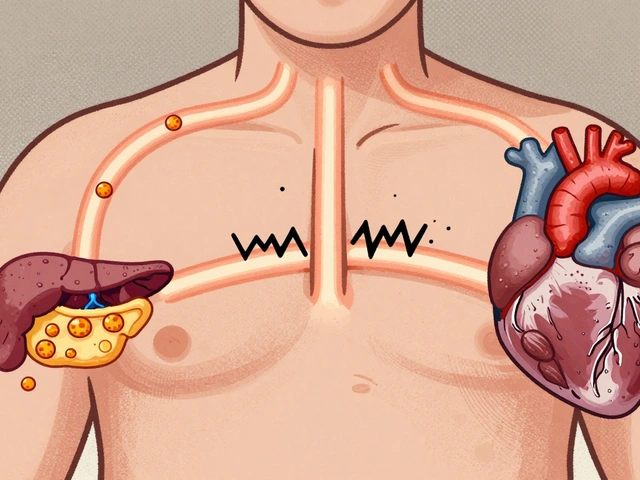Medical Research: Practical drug findings you can use
You want clear, useful research notes without the jargon. This category pulls together short, practical summaries of recent drug research so you can understand risks, mechanisms, and what to ask your doctor. Below you’ll find straightforward takeaways from two recent posts: one on Azathioprine and Raynaud's phenomenon, the other on how Imatinib works. Each summary tells you what was found, why it matters, and what to watch for.
Azathioprine and Raynaud's Phenomenon
Recent reviews flagged a possible link between Azathioprine, an immunosuppressant, and an increased risk of Raynaud's phenomenon — that fingertip color change and numbness triggered by cold or stress. The review pooled case reports and clinic observations showing more Raynaud's episodes after starting Azathioprine in some patients with autoimmune conditions. That doesn’t mean everyone on Azathioprine will get Raynaud's, but clinicians should watch for new or worsening symptoms, especially in patients with vascular sensitivity or existing circulation issues.
If you take Azathioprine, tell your provider about any fingertip color changes, unusual cold sensitivity, or pain in fingers and toes. Simple measures help: keep extremities warm, avoid sudden temperature drops, and review other meds that tighten blood vessels. Your doctor may check drug dose, test for other causes, or consider switching therapies if symptoms start to affect daily life.
How Imatinib Works — a plain explanation
Imatinib is a targeted cancer drug that changed how we treat some leukemias. It blocks specific abnormal proteins called tyrosine kinases that tell cancer cells to grow. By shutting down those signals, Imatinib slows or stops the cancer cells without hitting most healthy cells. That’s why patients often see better outcomes and fewer broad chemotherapy side effects.
For patients and caregivers: if you’re on Imatinib, expect regular blood tests to monitor response and side effects. Common issues include fatigue, nausea, or mild fluid retention. Serious reactions are less common but important to report: severe muscle pain, unusually low blood counts, or signs of liver trouble. Talk to your team about drug interactions — Imatinib can change how other meds behave.
How we use these research notes: each post focuses on one clear takeaway, clinical signs to watch, and practical next steps for patients and clinicians. We link to original reviews and clinical sources where available so you can dig deeper if you want the full data.
Want more like this? Scan our latest posts for drug mechanisms, safety signals, and short guides on what to ask at your next appointment. If a study mentions a new risk or mechanism, we explain how strong the evidence is and what actions make sense right now. That helps you stay informed without getting buried in technical papers.

- Jun 18, 2023
- Posted by Cillian Osterfield
Azathioprine and the Risk of Raynaud's Phenomenon: A Comprehensive Review
In a recent comprehensive review, I came across some intriguing findings on the relationship between Azathioprine and the risk of Raynaud's Phenomenon. For those who may not know, Azathioprine is an immunosuppressive medication often used in treating autoimmune diseases, while Raynaud's Phenomenon is a condition that causes the blood vessels in extremities to constrict when exposed to cold or stress. According to the review, there seems to be an association between the use of Azathioprine and an increased risk of developing Raynaud's Phenomenon. This is important information for both patients and healthcare providers to consider when weighing the benefits and risks of using Azathioprine. Further research is needed to better understand the underlying mechanisms and potential ways to mitigate this risk.

- Jun 12, 2023
- Posted by Cillian Osterfield
Understanding the mechanism of action of Imatinib
As a blogger, I've been researching the mechanism of action of Imatinib, a groundbreaking drug used to treat certain types of cancer. Imatinib works by specifically targeting and inhibiting the activity of abnormal proteins, known as tyrosine kinases, which are responsible for uncontrolled cell growth in cancers like chronic myeloid leukemia. By blocking these proteins, Imatinib is able to effectively stop the progression of cancerous cells. This targeted therapy has revolutionized cancer treatment, resulting in better outcomes and fewer side effects for patients. Understanding the mechanism of action of Imatinib helps us appreciate the advancements in cancer therapy and the potential for developing more targeted treatments in the future.
Categories
- Health and Wellness (70)
- Medications (67)
- Health and Medicine (28)
- Pharmacy Services (12)
- Mental Health (8)
- Health and Career (2)
- Medical Research (2)
- Business and Finance (2)
- Health Information (2)
Latest Posts
©2026 heydoctor.su. All rights reserved





